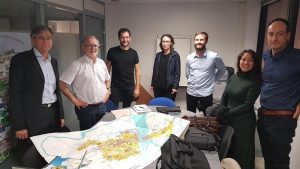First feedbacks on SUMPS Africa
On 23 October, an informal think tank met at CODATU headquarters to hear the first feedbacks on the MobiliseYourCity initiative in Africa. This presentation by Maël Martinie, echoed an official presentation made on November 17, 2019 at the 3rd MobilizeYourCity Africa Conference in Yaoundé on Mobility and focused mainly on the SUMPS of the cities of Douala and Yaoundé.
The MobiliseYourCity Partnership
Launched at COP21, the MobiliseYourCity partnership aims to support local and national governments in developing and transition cities and countries in planning urban mobility in order to make cities more inclusive, more livable, to improve their lives, improve the economic attractiveness and reduce their Greenhouse Gas (GHG) emissions.
The activities of the secretariat revolve around the implementation of two tools:
• The Sustainable Urban Mobility Plan (SUMP) at the local level.
• A National Urban Mobility Plan (NUMP) at the national level
Douala’s and Yaoundé’s SUMPs
With the SUMP of Santo Domingo, the SUMPS of Douala and Yaoundé are the first SUMPs developed within the framework of the MobilizeYourCity Partnership. CODATU has been commissioned by AFD to adapt the Standard Terms of Reference for SUMPs with the two Urban Communities of Douala and Yaoundé, in the context of cities. The AFD (financial partner of the SUMP) has launched a call for tenders by city to elaborate the SUMP, tenders that were won by SYSTRA for the city of Douala and by a consortium composed of DVDH, Transamo and Transitec for Yaoundé.
A summary of SUMP – Doula (FR) and SUMP – Yaoundé (FR)
A comparison of the implementation of the two SUMPs leaded us to make a first diagnosis on the progress of these two projects, to see the difficulties encountered and to suggest ways of improvement.
The main findings during the meeting
Informal think tank composed of members of Urbalyon (Patrice BERGER and Thibaut DESCROUX), CEREMA (Thierry GOIN), SYTRAL (Philipe BOSSUET), Marie DOLS (Consultant) and facilitated by MobiliseYourCity (Mael MARTINIE) and Codatu (Jean-Jacques HELLUIN, MARTIN Sofia, Antoine CLEMOT) was able to discuss their own experiences of improvement and made several findings and suggested areas for improvement.
- Among the shared findings was the importance of the role of cities or local authorities in project ownership and placing it at the center of the SUMP process. In this respect, it was recommended that this role of project management of the Cities or local authorities be included, as soon as the Standard Terms of Reference of the action were drafted, but also to ensure the capacity of the authority in the follow-up the process.
- Another observation concerned the methodology adopted in the diagnostic phase, and in particular two tools, the Household Travel Survey and the predictive traffic models to build the scenarios. The use of extensive surveys such as Household Travel Surveys is considered costly in time and resources, and not essential in the absolute. Thus, the group advocated Origin Destinations-type surveys accompanied by qualitative fieldwork of the urban socio-anthropology type. As for predictive models of traffic to build scenarios is expensive and is often limited in its expectations (as in Europe for that matter), under cover of a “scientific” approach. The committee proposed to limit the use of models, even if it has the merit of proposing interesting graphic renderings, and recommend relying on the observation and expertise of local counterparts, consultants and the concept of “strong lines” which does not necessarily lead upstream the choice of one mode rather than another.
- Finally the last observation concerns the articulation between transport and urbanism which is not sufficiently taken into account. Transportation documents are the only ones that are really likely to be implemented and should play a role of locomotive. It therefore seems crucial to articulate and prioritize the different planning documents. To achieve this, the think tank reaffirmed the importance of preparing the institutional structuring and governance (urban agencies) to strengthen the project management and give it a framework of action to drive the implementation of the projects action plans. The think tank also stressed that the work of prioritizing planning documents requires substantive work that is illusory to consider in the strict framework of the development of a SUMP.
The report is avaible here (FR) CR-Réunion SUMP du 23.10

